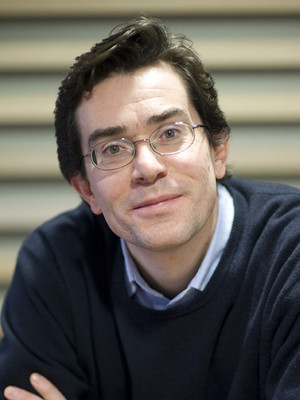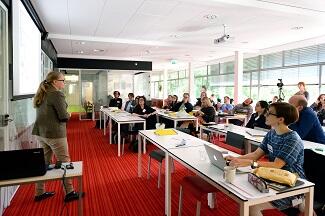Cancelled: Quantum Training and Junior Day
The Quantum Training and Junior Day (31/3 and 1/4) have been cancelled, because of the corona virus.
We will organise a Quantum Software Consortium (QSC) training related to quantum internet at the Lorentz Center in Leiden. We are delighted to have Ronald de Wolf (Amsterdam) and Wolfgang Löffler (Leiden) as the key lecturers.


The training days are aimed at all scientists working on experimental and theoretical quantum sciences, from quantum algorithms to simulations to quantum networks, and from superconducting to diamond to photonic qubits, to name just a few.
Tuesday March 31
10:00-13:00 : Ronald de Wolf - Applications for quantum internet (beyond QKD and CHSH).
[3 x 45-minute lectures with short breaks in between]
13:00-14:00 : lunch @ Lorentz
14:00-17:00 : Wolfgang Löffler - Quantum hardware for quantum networks: Spins and photons
[3 x 45-minute lectures with short breaks in between]
17:00-20:00 : drinks and pizza-dinner @ Lorentz
Wednesday April 1
10:00-13:00 : Practice session. Here we will do exercises about how to actually implement the software of Ronald's course using the hardware of Wolfgang's course.
13:00-14:00 : lunch @ Lorentz
14:00-20:00 : QSC Junior Day
In the afternoon of April 1st there will be a second edition of the QSC Junior Day, for PhD-students and postdocs only. Jonas Helsen has written a report of the first Junior Day which you can find under News.

17:30-20:00 : Networking with drinks and pizza, with the possibility of giving a 1-slide talk.
Registration for the Quantum training and Junior day is free but required. Please register before March 24 below the abstracts by clicking on "Apply now".
Ronald de Wolf - Applications for quantum internet (beyond QKD and CHSH)
Abstract:
This mini-course will describe some applications for a future quantum internet, beyond the obvious ones that have already been implemented such as quantum key distribution and CHSH non-locality experiments. I plan to focus on three topics, spending one hour on each:
1.Quantum communication complexity. In the simplest two-party case, Alice and Bob receive inputs x and y respectively, and want to compute some function f(x,y) with minimal communication between them. Quantum communication protocols can communicate qubits and/or use pre-shared entanglement. We will see some functions where quantum communication protocols are much more efficient than classical protocols.
2. Non-locality beyond CHSH. CHSH has been implemented many times, the first loophole-free implementation was done in Delft in 2015. CHSH requires only one shared EPR-pair, and is the simplest non-trivial non-locality experiment one can do. As quantum computers get bigger, we may also consider non-locality experiments that require more entanglement. We will describe some examples.
3. Quantum distributed computation.
Wolfgang Löffler - Quantum hardware for quantum networks: Spins and photons.
Abstract:
In this mini-course we will discuss and explore the physics of quantum hardware, focussing on applications for quantum networks and a bit on computation. We will discuss three topics:
1. Single and entangled photons for quantum networks. Single photons are the obvious choice to distribute quantum information, and might even be used to directly build up large-scale entangled networks. We will discuss the deterministic generation of true single photons and briefly introduce photon quantum optics, and then focus on complex entangled states and their detection.
2. Quantum memories: spins and spin-photon interfaces. Quantum networks larger than possible by direct photon transmission require quantum repeaters. In this part we will discuss a few possible systems, mainly focussing on electron and nuclear spins appearing in crystals, such as the diamond NV center.
3. From photons to superconducting qubits. The recent Google breakthrough has shown that the control of large entangled quantum states is possible, in this part I aim to present briefly the superconducting qubit platform, compare to photonic approaches and how they could possibly be interfaced.

